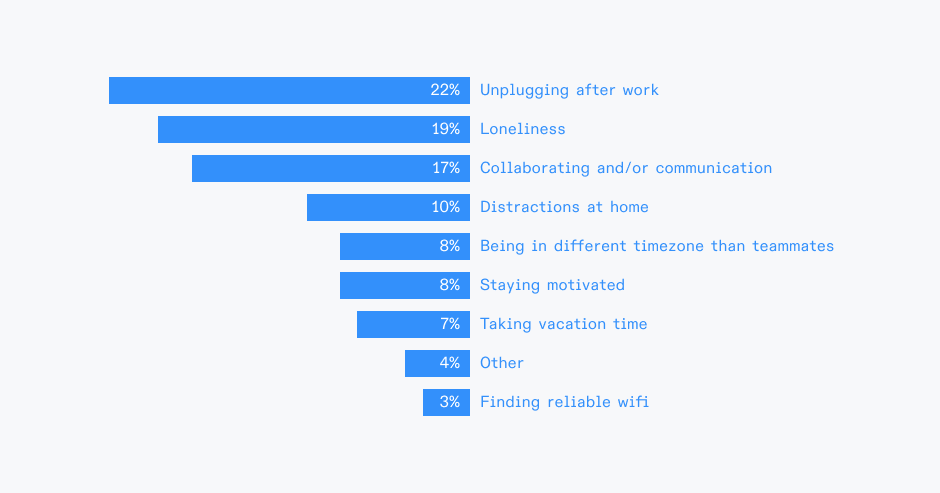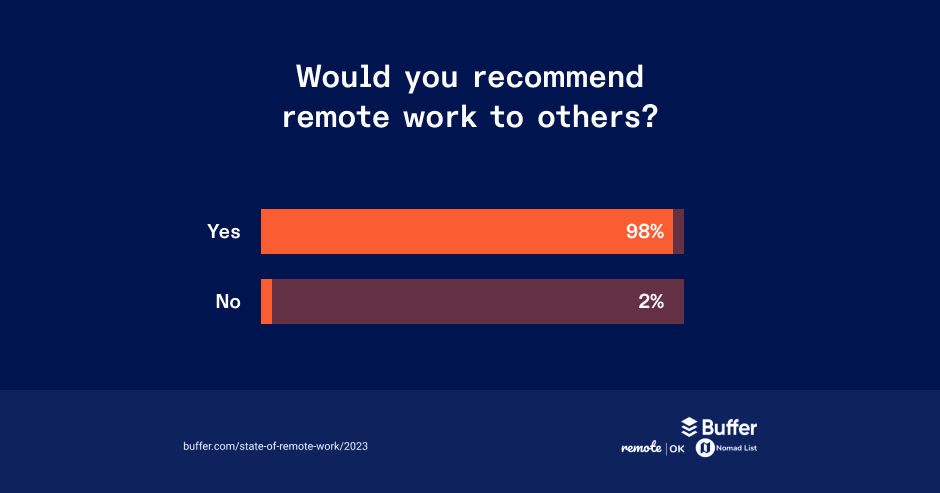No tiresome commutes. Savings galore. A workspace tailored to your liking. Freedom from prying managers and hovering colleagues. Remote work is great. But it's not all sunshine and rainbows. As anyone who's dabbled in remote work or manages a home-based business will tell you, remote work has its shadows, and navigating them can be quite the feat.
According to a report from the United Nations International Labour Organization, the productivity of remote workers often shines outside the traditional office, but there's more to the story. They're also prone to clocking in longer hours, a heightened work pace, and sometimes, increased stress levels.

At Index.dev, where a whopping 90% of our team operates remotely from their homes, we connect tech companies with seasoned tech talents across the globe, fostering a seamless remote work experience. We decided to delve deeper, seeking insights from our network of developers and fellow team members who relish their home-based work life. They generously shared their prime challenges of remote work along with strategies to conquer them. Buckle up, as we unveil their invaluable insights.
Also read: How Index.dev source and vet its engineering talent
1. Overworking
Remote work offers freedom, but it can lead to overworking. When work and home share a roof, it's hard to switch off. While some skeptics question remote work's productivity, the truth often takes a different form: remote workers can find themselves working longer hours than ever before.
I found it tough to set boundaries and stop working
Admits a developer from the Index.dev community. Many share this challenge. Here are some powerful tips to regain control:
- Set Appointments: Create end-of-day appointments on your calendar. It could be reading, a walk, or exercise, signaling work's end.
- Break Reminders: Remind yourself to pause. A daily walk can relieve eye strain. Try the Pomodoro method, working in focused bursts with breaks.
- Declare Departure: Announce when you're logging off. A quick Slack message and then shut down your computer.
- Create Space: Physically separate work and personal areas to define boundaries.
- Tech Timeout: Turn off notifications after work to resist work's pull.
Remote work thrives on balance. As another developer notes:
Finding harmony is key; overworking won't lead to lasting success.
2. Prioritizing work
In remote work, self-motivation is king, and time management its closest confidant. Without someone monitoring your every move, structuring your day becomes your responsibility. Yet, mastering this art isn't all smooth sailing. It's not just about getting the work done; it's about resisting the temptation to watch an episode from your favorite TV show, combating procrastination, or giving in to your dog's pleading eyes for a walk.
To combat this, consider these tactics:
- Task Limitation: Scale down your daily tasks. The Eisenhower matrix is your ally, helping you ditch unnecessary tasks and stay laser-focused on the essential ones. Alternatively, adopt the 1-3-5 rule: 1 big task, 3 medium ones, and 5 smaller tasks per day.
- Distraction Detour: Enlist distraction-busting tools. Test out tools that keep your focus intact during work hours.
- Energy Management: Shift your focus from time to energy. Different tasks demand varying bandwidths. Pair them with your peak focus times for optimal results.
Also read: 18 indispensable productivity tools for remote development teams
3. Interruptions
Remote work surely has its perks – no more colleagues popping by your desk or office distractions. However, as the Index.dev community of developers attests, a different breed of interruptions awaits. Home sweet home comes with its own set of symphonies – the dog barking, the doorbell ringing, or the delicious aroma of cooking. Family, friends, chores - they all clamor for your attention, turning focus into a tightrope act. The path to productivity demands a robust time management strategy that guards your dedicated work moments.
Consider these pointers to sail through interruptions:
- Permission to Interrupt: Not all interruptions are foes. Decide which interruptions are permissible and which can wait.
- Signaling Focus: Create cues that broadcast your focus. Whether it's a "do not disturb" sign or even locking the door – it sets the tone.
- Explain and Empathize: Let your folks know why undisturbed time is crucial. This builds understanding and respect for your work hours.
- Childcare Planning: Arranging childcare becomes a game-changer. Working when they're asleep could be an alternative.
- Independence Training: Nurture self-sufficiency in kids and partners. Teach them to find their own solutions to avoid constant reliance on you.
- Set Work Boundaries: Maintain consistent work hours and let calls slide during that time. Craft fictitious meetings if necessary.
- Change of Scenery: If all else fails, shift the battleground. Try a co-working space, library, or coffee shop for a change of pace.
As an Index.dev developer wisely points out:
Mastering interruptions is about control and adapting, ensuring workdays stay productive.
Are you a developer looking for a full-time remote job? Be part of the most vibrant engineer community and land long-term remote jobs with leading tech companies →
4. Isolation
Working remotely means the ultimate freedom, right? But it's not all unicorns. Isolation can creep in, giving you a bad case of "cabin fever." Your workspace's four walls can transform into your universe. Amidst virtual tools like Slack, real human interaction can take a hit. Workers in shared offices often share meals and drinks after work, as well as impromptu "watercooler" conversations. How about remote workers? Many of us work asynchronously with our teammates and may only have online friends to talk to.
Consider these solutions to conquer isolation:
- Social Breaks: Mix work with play. Schedule breaks that involve social outings, like lunch with pals, between work sessions.
- Alternate Workspace: Co-working spaces or coffee shops can breathe life into your routine. These "second offices" offer human presence and a sense of connection.
- Community Joining: Pledge to be more than a screen dweller. Participate in local groups or organizations. It's a chance to bridge the gap between virtual and real life.
As a remote-working member at Index.dev shares:
Working solo doesn't have to mean being a lone ranger. It's about threading connections, finding your tribe.
5. Time zone differences
The rhythm of global clocks is what drives remote work, but the symphony isn't always harmonious. As you rise, your teammate might be heading to bed, and this time zone difference can lead to collaboration hiccups. A pressing question left unanswered or an immediate need languishing can be frustrating. However, a well-timed strategy can bridge this temporal gap. Here's how to make time zones work for you:
- The Four-Hour Sweet Spot: Seek a four-hour time frame when both you and your teammates are awake. This ensures you're not playing tag with time zones for immediate answers.
- Flexible Messaging: Be strategic in your communication. Plan messages to align with their working hours. And when you're off-duty, resist the urge to stay glued to notifications.
- Tag Team Work: Remote work's beauty is the flexibility it offers. Hand off tasks that need continuity to teammates in different time zones. This way, while you rest, your work progresses.
As an Index.dev advocate of remote work puts it:
In the realm of remote work, collaboration knows no boundaries. The four-hour overlap is this bridge that connects your expertise, making remote collaboration feel effortless.

Skip the talent struggle. Connect with seasoned, expertly vetted engineers effortlessly. Get started in just 48 hours →
Embrace the remote revolution
You've just unlocked five powerful strategies to master the art of remote work. If you're in search of skilled developers, whether for full-time roles or project-based endeavors, consider Index.dev. Our commitment to excellence shines through our rigorous assessment process, boasting a 97% successful match rate and an average matching time of a mere 48 hours. Transparency is our hallmark, and with no hidden fees, your journey with Index.dev is paved with trust.
To all the senior developers yearning for remote software jobs with esteemed US and UK companies, your quest ends here. Index.dev opens doors to opportunities that resonate with your expertise. Our engineers relish competitive salaries, exceeding market averages across countries.